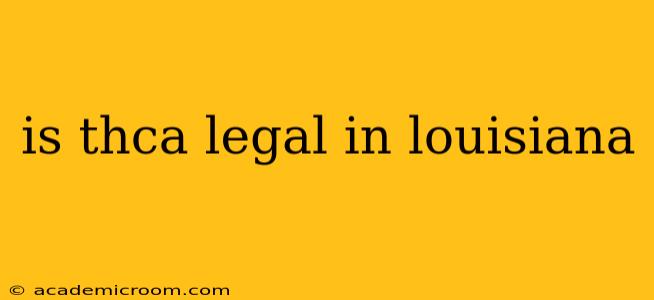The legality of THCA (tetrahydrocannabinolic acid) in Louisiana is a nuanced issue, demanding a careful examination of state and federal laws. While the situation is currently complex, understanding the distinctions between THCA, THC, and hemp is crucial for determining its legal status.
What is THCA?
THCA is a non-psychoactive precursor to THC (delta-9-tetrahydrocannabinol), the primary psychoactive compound in marijuana. It's found naturally in the cannabis plant, and upon heating (a process called decarboxylation), it converts to THC. Crucially, its non-psychoactive nature distinguishes it from THC.
Louisiana's Hemp Laws and the 2018 Farm Bill
The 2018 Farm Bill legalized hemp at the federal level, defining hemp as cannabis containing less than 0.3% delta-9 THC by dry weight. Louisiana, like many states, has its own hemp laws designed to comply with the Farm Bill, but this is where the complexities arise.
Louisiana's regulations concerning hemp production, processing, and sale aim to adhere to the federal 0.3% THC threshold. However, the legal gray area around THCA comes into play because, while it's not psychoactive itself, it can convert to THC. Therefore, the crucial factor isn't just the THCA content, but the potential THC content after decarboxylation.
Key Questions Regarding THCA Legality in Louisiana
Here, we address common questions surrounding THCA's legal status in Louisiana:
1. Is THCA considered hemp in Louisiana?
This is the core of the issue. While the Louisiana Department of Agriculture and Forestry (LDAF) regulates hemp production, precise guidelines on THCA levels in processed hemp products remain unclear. The focus remains largely on the final product's delta-9 THC content. If a product containing THCA has a delta-9 THC concentration exceeding 0.3% after decarboxylation, it could potentially violate state and federal law, regardless of its THCA levels.
2. Can I legally purchase THCA products in Louisiana?
The legality of purchasing THCA products in Louisiana remains uncertain. While some retailers may sell products labeled as containing THCA, the lack of consistent state-wide guidelines creates a risky market. Consumers should proceed with caution, as enforcement of existing laws regarding THC limits can be varied and depends on individual circumstances. This is particularly true regarding products where the total delta-9 THC content after conversion might exceed the permissible 0.3% threshold.
3. What are the penalties for possessing or selling illegal THCA products in Louisiana?
Penalties for possessing or selling products with THC levels exceeding legal limits can range from fines to imprisonment. The severity of penalties depends on the amount of THC involved and other related factors. Consulting with a legal professional experienced in Louisiana hemp law is crucial before engaging in any activity involving THCA-containing products.
4. How does Louisiana's definition of hemp differ from other states?
Louisiana's hemp regulations, while striving to align with the 2018 Farm Bill, might differ from other states in their specific interpretations and enforcement of the 0.3% THC threshold, especially regarding THCA’s conversion into THC. Some states have more clearly defined regulations concerning THCA. This lack of uniformity across states makes navigating interstate commerce involving hemp-derived products extremely challenging.
Conclusion:
The legality of THCA in Louisiana is currently ambiguous. The lack of clear state guidelines on permissible THCA levels in products that could convert to THC leaves a significant gray area. Consumers and businesses should carefully consider the potential risks and consult legal counsel before engaging in the production, distribution, or purchase of THCA-containing products. Keeping abreast of changes in Louisiana hemp regulations is essential to remain compliant with the law. Always prioritize purchasing from reputable businesses that can demonstrate compliance with current Louisiana regulations.
